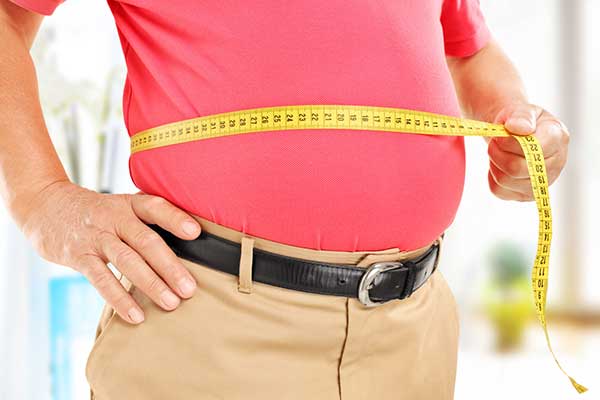Those of us with a bit of belly fat may take comfort in the fact that our excess weight is confined to our gut.
That can’t be as bad as being fat all over, can it?
Yes, actually it can.
Researchers have found that having the proverbial “pot belly” while being thin elsewhere is worse for your health than being fat everywhere.
Scientists at the Mayo Clinic followed the health of 1,700 people for 16 years. The subjects were all over 45.
Specifically, the scientists looked at how the location of participants’ fat affected their health. The study compared people with belly fat who had a normal weight to those whose total weight made them obese.
It turns out that belly fat is far worse than overall obesity when it comes to heart health. People with belly fat were 79% more likely to suffer a heart attack or stroke.i
Time for a Gut Check
Dr. Jose Medina-Inojosa is a researcher with the Mayo Clinic’s division of preventive cardiology. He is one of the authors of the study. “People with a normal weight but a fat belly have more chance of heart problems than people without a fat belly, even if they are obese,” he said.ii
Although many Americans are obsessed with weight loss, Dr. Medina Inojosa says that “waist loss” is more important.
His study was presented at the European Society of Cardiology Congress.
Belly Fat Is the Root Cause of Many Diseases
Doctors often call belly fat “visceral” fat. It is different than subcutaneous fat, which is what you have when you are fat all over.
Visceral fat surrounds and presses on your internal organs. This decreases the ability of the organs to function properly.
Researchers say that visceral fat can cause “lipotoxicity.” It releases more fatty acids than subcutaneous fat does. These fatty acids can lead to dangerous fat deposits in the liver, heart, and pancreas. This increases the risk of liver disease, heart disease, and type 2 diabetes.
Belly fat is also linked to dementia, cancer, and erectile dysfunction.
And once you have belly fat, you can get caught in a vicious cycle. It diminishes your ability to exercise. That means you’ll put on even more belly fat.iii
Take the Belly Fat Test
Are you at risk from a bulging belly? You can find out with this simple at-home test.
Measure your waist circumference at your navel with your belly relaxed. Then measure the circumference of your hips at the widest point. If your waist is bigger than your hips, you have too much belly fat.iv
Two Supplements to Beat Belly Fat
A healthy diet and exercise can reduce belly fat. But two supplements can help, too.
Vitamin D. Researchers in Holland found that a vitamin D deficiency has a “strong relationship with increasing amounts of abdominal fat.” Their study of over 6,000 people concluded that “individuals with larger waistlines should consider having their vitamin D levels checked.”v
At your next physical, ask your doctor to check your vitamin D. It’s a simple blood draw that can be done along with your other tests.
If your vitamin D level is less than 20 ng/mL, you are deficient. Spending 15 minutes in the sun each day with your arms and legs exposed can help increase your levels.
If that’s not possible, take a 5,000 mg vitamin D supplement every day. Make sure you buy the D3 form, not D2. D3 will increase your levels of vitamin D more than twice as much as D2 will.
Black pepper. In a study published in the journal Bioscience, Biotechnology, and Biochemistry, scientists found that black pepper reduces visceral fat.vi
Black pepper contains the compound piperine. It gives pepper its pungent flavor. It also helps make you thinner.
Not only does pepper reduce belly fat, but it keeps new fat cells from forming. And it boosts your metabolism, helping you burn more calories.
You can’t get a therapeutic dose of piperine from using black pepper as a spice. Instead, take a black pepper or piperine supplement. They are widely available at health stores and online.
When it comes to health, many people focus on losing weight. The fact is, reducing belly fat is far more important.
Editor’s Note: Have you gained weight during the pandemic? You’re not alone. Americans have packed on an average of two pounds a month during the coronavirus crisis, according to a recently study.
Read our monthly journal Independent Healing to discover a way to lose the weight…and keep it off for good. Go HERE to find out more.
Related Articles
The Hidden Reason You’re Putting on Weight

